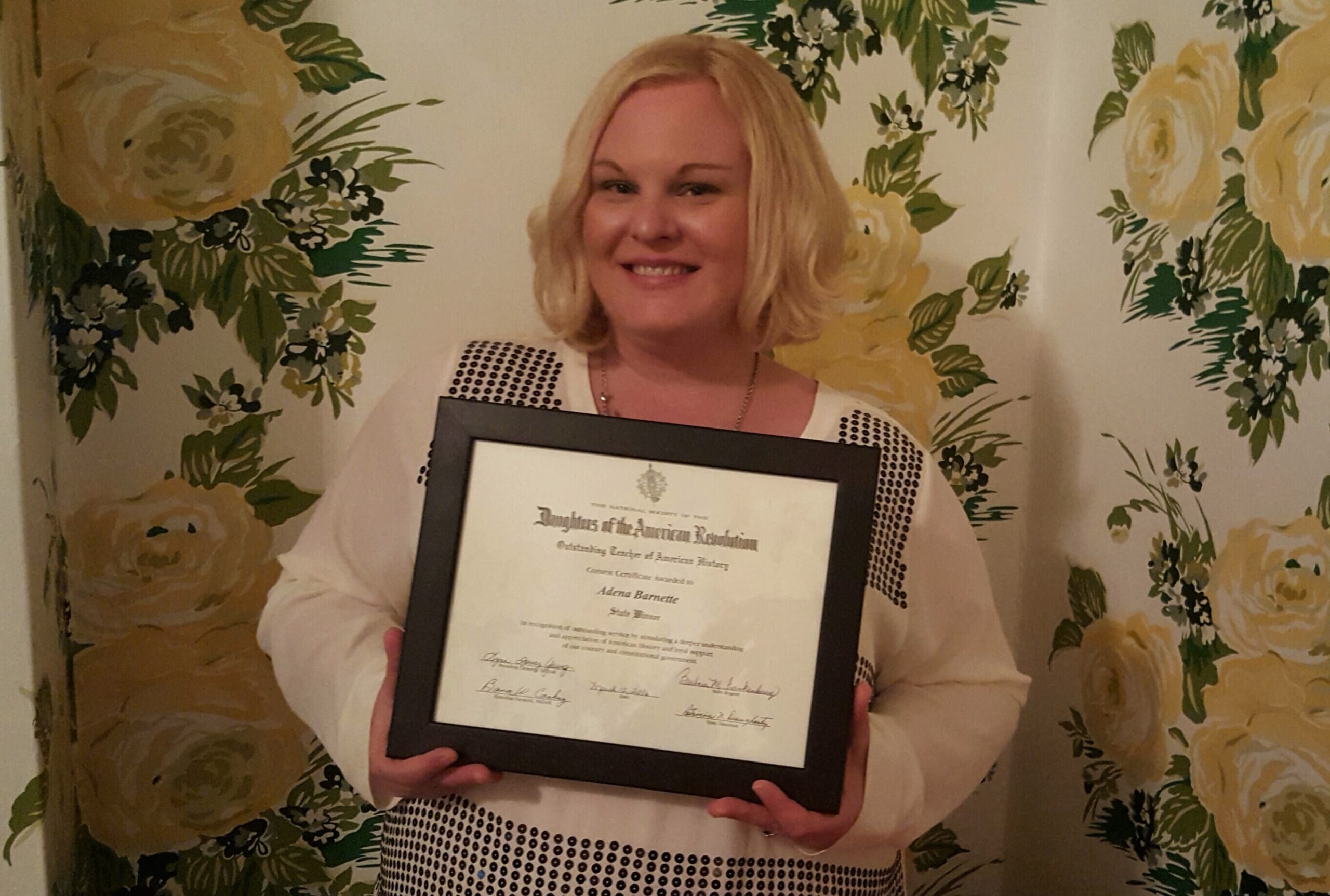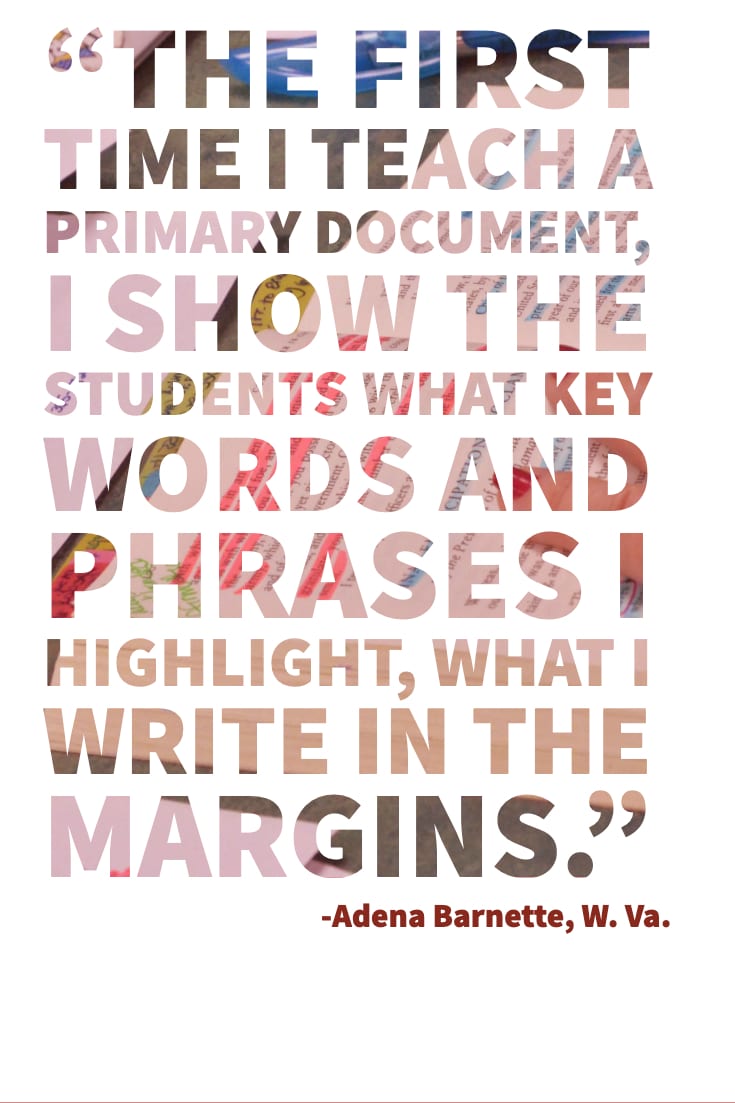Meet Our Teachers
Adena Barnette

West Virginia Teacher Points Hometown Students to the Broader World
Adena Barnette teaches American history and civics in her hometown of Ripley, West Virginia, at Ripley High School from which she, her parents and grandparents all graduated. Yet as an educator, she sees herself pointing her fellow West Virginians to a broader world. Barnette, a 2014 graduate of TAH.org’s Master of Arts in American History and Government (MAHG) program at Ashland University, is a traveler with a global curiosity. She is also a West Virginia history buff whose thesis exploring the process that led to West Virginia statehood won the MAHG Chairman’s Award.

Barnette has traveled to India, South Korea, and Germany in summer exchange programs for teachers. Within the US, she has attended teacher institutes at Colonial Williamsburg, Washington’s birthplace of Mount Vernon, and—as a Madison Fellow—Georgetown University.
She won the prestigious Madison Fellowship, awarded by the James Madison Memorial Fellowship Foundation annually to up to two representatives from each state, to fund her Masters study. Then she enrolled in MAHG. “I wanted the best program; Ashland’s program is the best,” Barnette said.
A Window on the Constitution: The Creation of West Virginia
Madison Fellows are encouraged to emphasize Constitutional studies in their Masters work. Barnette knew that West Virginia’s creation during our Civil War had raised Constitutional questions and remained controversial in some circles. It was “the only state in the Union to have been carved from another during a state of war,” and after the Civil War, Virginia repeatedly challenged its creation in court.
Questions remain even among West Virginians. The state exists because the northwest counties of old Virginia voted against secession. Today, however, “given that we are the northernmost of the southern states, or the southernmost of the northern states, there are some Confederate sympathizers here” who stoke the controversy over statehood, Barnette explained. At the time she selected her thesis topic, the sesquicentennial of the state’s birth (in June 2013), was near. Barnette decided, “I’m going to prove that West Virginia’s creation was Constitutional.”
She found the subject opens a door into a range of Constitutional issues. Following a procedure outlined in Article IV of the US Constitution, West Virginians convened three separate conventions during their road to statehood: once to declare their loyalty to the Union, a second time to declare their intention to form a new state, and a third time to write a state constitution. But then a federal review process began. Barnette’s thesis discussed the debates in Congress over the West Virginia statehood bill, the debates within Lincoln’s cabinet when the bill awaited his signature, and the 1871 Supreme Court case in which Virginia challenged the addition of two counties to West Virginia that had not been included in the original statehood bill.
The entire story had rarely if ever been discussed in history books, Barnette found. She researched her thesis using primary sources: “I spent my time reading old newspapers and the Congressional Record.” Her advisor, Professor Mac Owens of the Naval War College, told Barnette that she had uncovered ample material for a PhD thesis, and Barnette hopes one day to pursue this further study.
A Case Study on the Rights of Free Men
For now, Barnette’s thesis work informs a new college-level dual enrollment course she is offering at Ripley High (students receive college credit through West Virginia State) on West Virginia history. Her students learn that the statehood movement arose not simply from opposition to slavery and secession, but from insistence on “the rights of free men who might not have a lot of land or money—their right to participate in the political process.” When the Constitutional Convention decided on the “3/5ths compromise,” allowing southern states to count their slaves among their population in the apportionment of representatives, western Virginia was disadvantaged. “There were 400,000 slaves in eastern Virginia and only 18,000 slaves” in the part of the state that would become West Virginia, giving that area a disproportionately small share of representation. “And until 1851, there were property qualifications for voting in Virginia. Most people are unaware of that. Most people are taught that with Andrew Jackson and the Era of the Common Man, property qualifications disappeared around 1828. Not in West Virginia!”
Encouraging Aspirations and Building Skills
Learning state history also helps Barnette’s students feel pride in their little-understood region. “If my students travel outside of the state, they find other Americans don’t realize we’re not part of Virginia,” she noted. Yet few of her students do travel; many have limited expectations. “A lot of my students believe they cannot accomplish as much as others, because they are from West Virginia—or that they’re stuck here. I believe that’s why I’m still a teacher at Ripley High School after eleven years. It’s always my goal to let kids know there is a broader world, you can go to college, you can see the world, you can think about big ideas.”
Barnette teaches the college prep track at Ripley, working with students “who want to go to college but don’t yet have the skills. To bring them up to speed, we focus on how to read primary source documents. We’ve found it helps students when teachers share with them how we ourselves work through a text. The first time I teach a primary document, I show the students what key words and phrases I highlight, what I write in the margins.” Ashbrook’s Masters program gave her the model for this approach. The professors in the program guide teachers through the parsing of primary texts and then open a discussion on the text’s implications. “That’s what MAHG is about: people interacting on the same level,” sometimes disagreeing about meanings, but agreeing that all are capable of understanding the words of past generations. “That’s what I want for my classroom,” Barnette said. “History is not about regurgitation; it’s about the interpretation of facts.”
Reading primary documents also helps the struggling writer. “To become a good writer, you have to emulate those writers you admire.” The MAHG program acquaints teachers—many with writing skills grown rusty since their undergraduate study—with “authors you can model yourself on. It helps you find writers that you like. You think about what they say and how they say it. . . . I’m not saying I learned to write like Lincoln, but man, do I love the way he writes! What I enjoy about Lincoln, FDR and Washington is that they wrote in a plain but powerful style. Thomas Paine’s style was plain, but powerful enough to change the world.”

